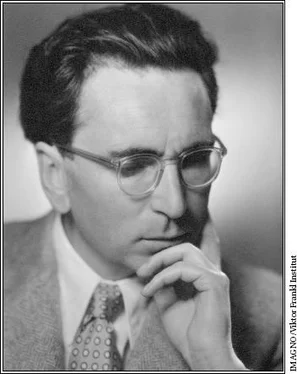Sometimes the other men invented amusing dreams about the future, such as forecasting that during a future dinner engagement they might forget themselves when the soup was served and beg the hostess to ladle it “from the bottom.”
The attempt to develop a sense of humor and to see things in a humorous light is some kind of a trick learned while mastering the art of living. Yet it is possible to practice the art of living even in a concentration camp, although suffering is omnipresent. To draw an analogy: a man’s suffering is similar to the behavior of gas. If a certain quantity of gas is pumped into an empty chamber, it will fill the chamber completely and evenly, no matter how big the chamber. Thus suffering completely fills the human soul and conscious mind, no matter whether the suffering is great or little. Therefore the “size” of human suffering is absolutely relative.
It also follows that a very trifling thing can cause the greatest of joys. Take as an example something that happened on our journey from Auschwitz to the camp affliated with Dachau. We had all been afraid that our transport was heading for the Mauthausen camp. We became more and more tense as we approached a certain bridge over the Danube which the train would have to cross to reach Mauthausen, according to the statement of experienced traveling companions. Those who have never seen anything similar cannot possibly imagine the dance of joy performed in the car- riage by the prisoners when they saw that our transport was not crossing the bridge and was instead heading “only” for Dachau.
And again, what happened on our arrival in that camp, after a journey lasting two days and three nights? There had not been enough room for everybody to crouch on the floor of the carriage at the same time. The majority of us had to stand all the way, while a few took turns at squatting on the scanty straw which was soaked with human urine. When we arrived the first important news that we heard from older prisoners was that this comparatively small camp (its population was 2,500) had no “oven,” no crematorium, no gas! That meant that a person who had become a “Moslem” could not be taken straight to the gas chamber, but would have to wait until a so-called “sick convoy” had been arranged to return to Auschwitz. This joyful surprise put us all in a good mood. The wish of the senior warden of our hut in Auschwitz had come true: we had come, as quickly as possible, to a camp which did not have a “chimney”—unlike Auschwitz. We laughed and cracked jokes in spite of, and during, all we had to go through in the next few hours.
When we new arrivals were counted, one of us was missing. So we had to wait outside in the rain and cold wind until the missing man was found. He was at last discovered in a hut, where he had fallen asleep from exhaustion. Then the roll call was turned into a punishment parade. All through the night and late into the next morning, we had to stand outside, frozen and soaked to the skin after the strain of our long journey. And yet we were all very pleased! There was no chimney in this camp and Auschwitz was a long way off.
Another time we saw a group of convicts pass our work site. How obvious the relativity of all suffering appeared to us then! We envied those prisoners their relatively well- regulated, secure and happy life. They surely had regular opportunities to take baths, we thought sadly. They surely had toothbrushes and clothesbrushes, mattresses—a separate one for each of them—and monthly mail bringing them news of the whereabouts of their relatives, or at least of whether they were still alive or not. We had lost all that a long time ago.
And how we envied those of us who had the opportunity to get into a factory and work in a sheltered room! It was everyone’s wish to have such a lifesaving piece of luck. The scale of relative luck extends even further. Even among those detachments outside the camp (in one of which I was a member) there were some units which were considered worse than others. One could envy a man who did not have to wade in deep, muddy clay on a steep slope emptying the tubs of a small field railway for twelve hours daily. Most of the daily accidents occurred on this job, and they were often fatal.
In other work parties the foremen maintained an apparently local tradition of dealing out numerous blows, which made us talk of the relative luck of not being under their command, or perhaps of being under it only temporarily. Once, by an unlucky chance, I got into such a group. If an air raid alarm had not interrupted us after two hours (during which time the foreman had worked on me especially), making it necessary to regroup the workers afterwards, I think that I would have returned to camp on one of the sledges which carried those who had died or were dying from exhaustion. No one can imagine the relief that the siren can bring in such a situation; not even a boxer who has heard the bell signifying the finish of a round and who is thus saved at the last minute from the danger of a knockout.
We were grateful for the smallest of mercies. We were glad when there was time to delouse before going to bed, although in itself this was no pleasure, as it meant standing naked in an unheated hut where icicles hung from the ceiling. But we were thankful if there was no air raid alarm during this operation and the lights were not switched off. If we could not do the job properly, we were kept awake half the night.
The meager pleasures of camp life provided a kind of negative happiness—“freedom from suffering” as Schopenhauer put it—and even that in a relative way only. Real positive pleasures, even small ones, were very few. I remember drawing up a kind of balance sheet of pleasures one day and finding that in many, many past weeks I had experienced only two pleasurable moments. One occurred when, on returning from work, I was admitted to the cook house after a long wait and was assigned to the line filing up to prisoner-cook F——. He stood behind one of the huge pans and ladled soup into the bowls which were held out to him by the prisoners, who hurriedly filed past. He was the only cook who did not look at the men whose bowls he was filling; the only cook who dealt out the soup equally, regardless of recipient, and who did not make favorites of his personal friends or countrymen, picking out the potatoes for them, while the others got watery soup skimmed from the top.
But it is not for me to pass judgment on those prisoners who put their own people above everyone else. Who can throw a stone at a man who favors his friends under circumstances when, sooner or later, it is a question of life or death? No man should judge unless he asks himself in absolute honesty whether in a similar situation he might not have done the same.
Long after I had resumed normal life again (that means a long time after my release from camp), somebody showed me an illustrated weekly with photographs of prisoners lying crowded on their bunks, staring dully at a visitor. “Isn’t this terrible, the dreadful staring faces—everything about it.”
“Why?” I asked, for I genuinely did not understand. For at that moment I saw it all again: at 5:00 A.M. it was still pitch dark outside. I was lying on the hard boards in an earthen hut where about seventy of us were “taken care of.” We were sick and did not have to leave camp for work; we did not have to go on parade. We could lie all day in our little corner in the hut and doze and wait for the daily distribution of bread (which, of course, was reduced for the sick) and for the daily helping of soup (watered down and also decreased in quantity). But how content we were; happy in spite of everything. While we cowered against each other to avoid any unnecessary loss of warmth, and were too lazy and disinterested to move a finger unnecessarily, we heard shrill whistles and shouts from the square where the night shift had just returned and was assembling for roll call. The door was flung open, and the snowstorm blew into our hut. An exhausted comrade, covered with snow, stumbled inside to sit down for a few minutes. But the senior warden turned him out again. It was strictly forbidden to admit a stranger to a hut while a check-up on the men was in progress. How sorry I was for that fellow and how glad not to be in his skin at that moment, but instead to be sick and able to doze on in the sick quarters! What a lifesaver it was to have two days there, and perhaps even two extra days after those!
Читать дальше












